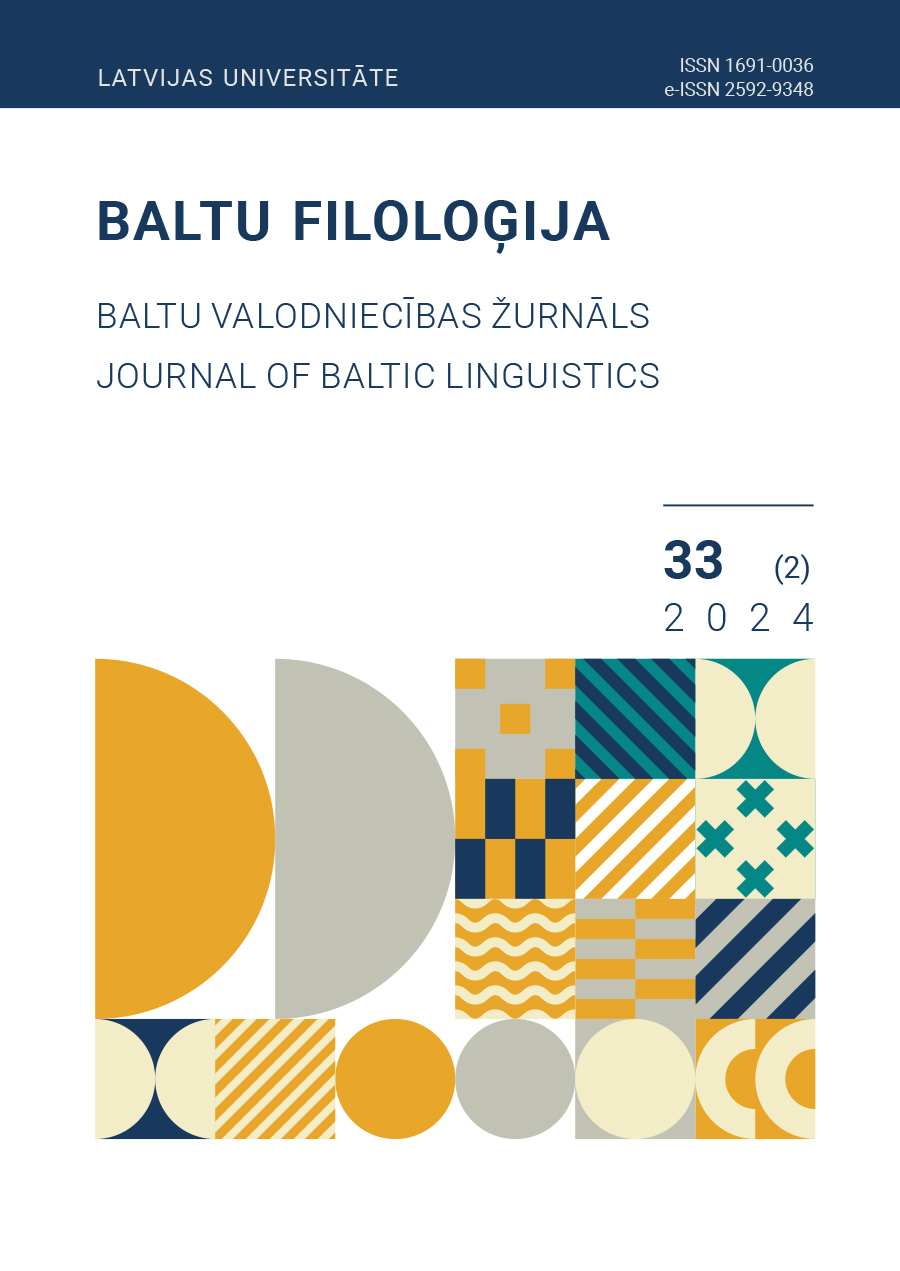The Words labība and padoms in Texts of the 16th–17th Century and in the Historical Dictionary of Latvian
DOI:
https://doi.org/10.22364/bf.33.2.03Keywords:
language history, historical dictionary, written sources of 16th–17th century, semanticsAbstract
In the article, the lexemes labība and padoms and their use in the 16th and 17th century Latvian written sources is discussed. Although in the 17th century the word labība in Latvian already has the settled concrete meaning ‘corn, grain’ (and in such cases potential derivatives are not formed), in some early written sources the word is used also with the meaning ‘goods, property’. Such a use appears in the works of Georg Mancelius in a particular context – in the 53rd verse of the 1st chapter of the Gospel of Luke. Supposedly, G. Mancelius had taken over the word labība in this meaning from an earlier text, possibly from the Vidzeme Lutheran Hymnal of 1615. It is not known who wrote the word labība in such a meaning, but it is possible that such a use was influenced by the German words Güter, Gütern (cf. Low German güdern, German Gut ‘property’, gut ‘good’, Gute ‘the good’) in the corresponding text. In the Bible translation of Ernst Glück and in other sources from the end of the 17th century in the discussed text of the Gospel of Luke the word labums ‘the good’, in modern translations – labumi ‘goods, treats’ is used. However, such a use of the word labība ‘goods’ is fragmentary; in the 17th century it is mostly used in the meaning ‘corn, grain’ or in wider meaning ‘food, harvest, bread’.
Whereas in sources from the end of the 16th century in the mentioned verse of the Gospel of Luke the word padoms is used, in early Latvian writings it has several meanings which are used concurrently in the texts. The word padoms has the meanings ‘property, riches, goods’, ‘advice on how to act’ (which is the most common meaning nowadays), as well as ‘purpose, intention; decision, judgement’ and ‘mind, reason, wisdom’. The very first use of this word is found in the so-called Lord’s Prayer of Simon Grunau from 1520. In this text, the meaning of the word padoms could be interpreted as ‘purpose, intention’. Supposedly, the use of the word padoms in the early Latvian texts concurrently in several meanings was influenced by the German word Rat ‘advice’, which in early religious texts in German is also used in several other meanings.
References
CC1585 = Catechismvs Catholicorum. 1585.
Ench1586 = Enchiridion. 1586.
EvEp1587 = Euangelia vnd Episteln. 1587.
EvEp1615 = Euangelia vnd Episteln. 1615.
Fuer1650_70_1ms = Fürecker, Christopher. Lettisches un Teutsches Wörterbuch. 1650.
Fuer1650_70_2ms = Fürecker, Christopher. Lettisches un Teutsches Wörterbuch. 1650.
Gr1520_PN = Grūnava tēvreize. 1520.
JT1685 = Tas Jauns Testaments. 1685.
LGL1685_K1 = Lettische geistliche Lieder vnd Collecten. 1685.
LGL1685_V5 = Lettische geistliche Lieder vnd Collecten. 1685.
Manc1631_LVM = Mancelius, Georgius. Lettisch Vade mecum. 1631.
Manc1631_Syr = Mancelius, Georgius. Das Haus=, Zucht= vnd Lehrbuch Jesu Syrachs. 1631.
Manc1637_Sal = Mancelius, Georgius. Die Sprüche Salomonis. 1637.
Manc1638_L = Mancelius, Georgius. Lettus. 1638.
Manc1638_PhL = Mancelius, Georgius. Phraseologia Lettica. 1638.
Manc1638_Run = Mancelius, Georgius. Desmit sarunas. 1638.
Manc1654_LP1 = Mancelius, Georgius. Lang=gewünschte Lettische Postill I. 1654.
Manc1654_LP2 = Mancelius, Georgius. Lang=gewünschte Lettische Postill II. 1654.
Ps1615 = Psalmen vnd geistlihe Lieder. 1615.
UP1587 = Vndeudsche Psalmen. 1587.
VD1689_94 = Ta Swehta Grahmata. 1689–1694. Pieejams: https://senie.korpuss.lv
Baltiņa, Maija. 1976. Vēlreiz par izskaņām -ums un -ība. Latviešu valodas kultūras jautājumi. 12, Rīga: Liesma, 120–126.
Bībele 1965 = Bībele. Vecās un Jaunās Derības Svētie Raksti. [Rīga]: Latvijas Bībeles biedrība, 1993 [1965].
Bībele 2012 = Bībele ar deiterokanoniskajām grāmatām. [Rīga]: Latvijas Bībeles biedrība, 2012.
DWb = Deutsches Wörterbuch von Jacob Grimm und Wilhelm Grimm. Pieejams: https://woerterbuchnetz.de
HIB = Hebrew Interlinear Bible. Pieejams: https://www.scripture4all.org/OnlineInterlinear/Hebrew_Index.htm
GIB = Greek Interlinear Bible. Pieejams: https://www.scripture4all.org/OnlineInterlinear/Greek_Index.htm
Endzelīns, Jānis. 1951. Latviešu valodas gramatika. Rīga: Latvijas Valsts izdevniecība.
Endzelīns, Jānis (red.), Ozoliņš, Pēteris (sast.). 1935. Valodas prakses jautājumi. Rīga: Ramave.
Endzelīns, Jānis (red.), Rūķe, Velta (sast.). 1940. Valodas un rakstības jautājumi. Rīga: Ramave.
Fraenkel Ernst. 1962. Litauisches etymologisches Wörterbuch. I. Heidelberg: Carl Winter Universitätsver-lag; Gottingen: Vandenhoeck & Ruprecht.
Frīdenberga, Anna. 2016a. Nominālā vārddarināšana Georga Manceļa darbos. Promocijas darbs. Rīga: Latvijas Universitāte.
Frīdenberga, Anna. 2016b. Variantums Georga Manceļa tekstos. Baltu filoloģija. XXV (2), Rīga: LU Akadēmiskais apgāds, 5–19.
Lange, Jacob. 1777 [1772–1777]. Vollständiges deutschlettisches und lettischdeutsches Lexicon, nach den Hauptdialecten in Lief- und Curland. Mitau: Fr. Steffenhagen.
LEV = Karulis, Konstantīns. 2001. Latviešu etimoloģijas vārdnīca. Rīga: Avots.
Luters, Mārtiņš. 2012. Mazais Katehisms. Rīga: Luterisma mantojuma fonds.
Luther, Martin. 1545. Biblia: das ist: die gantze heilige Schrifft: Deudsch. Auffs new zugericht. Wittem-berg: Hans Lufft. Pieejams: http://www.zeno.org/Literatur/M/Luther,+Martin/Luther-Bibel+1545
LVVV = Andronova, Everita; Frīdenberga, Anna; Siliņa-Piņķe, Renāte; Trumpa, Anta; Vanags, Pēteris. 2016–2023. Latviešu valodas vēsturiskā vārdnīca (16.–17. gadsimts). Pieejams: https://lvvv.tezaurs.lv/
ME = Mīlenbahs, Kārlis (1923–1932). Latviešu valodas vārdnīca. I–IV. Rediģējis, papildinājis, turpinājis J. Endzelīns. Rīga: Izglītības ministrija.
MLVV = Mūsdienu latviešu valodas vārdnīca. Pieejams: https://mlvv.tezaurs.lv
Ulmann, Carl Christian. 1872. Lettisches Wörterbuch. Erster Theil. Riga: H. Brutzer & Co.
Vanags, Pēteris. 2000. Luterāņu rokasgrāmatas avoti. Vecākā perioda (16. gs.–17. gs. sākuma) latviešu teksti. Stokholma: Memento, Rīga: Mantojums.
VLV = Granta, Katrīna; Pampe, Eleonora. 1990. Vācu-latviešu vārdnīca. Rīga: Avots.
VNSP = Profesora J. Endzelīna atbildes. 2002. Rīgas Latviešu biedrības valodniecības nodaļas sēžu protokoli. 1933–1942. Kļaviņš, Pēteris (priekšvārds un rādītāji). 2. izd. ASV: Ramave.
Zemzare, Daina. 1961. Latviešu vārdnīcas. Rīga: Latvijas PSR Zinātņu akadēmijas izdevniecība.
Downloads
Published
Issue
Section
License
Copyright (c) 2024 University of Latvia

This work is licensed under a Creative Commons Attribution-NonCommercial 4.0 International License.


